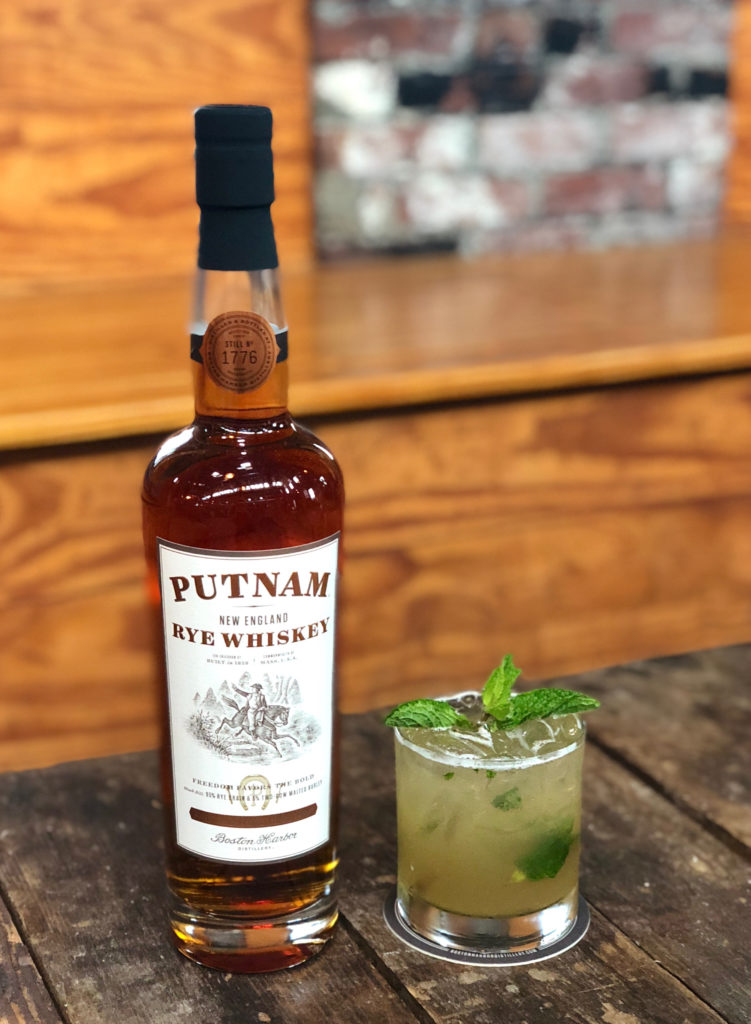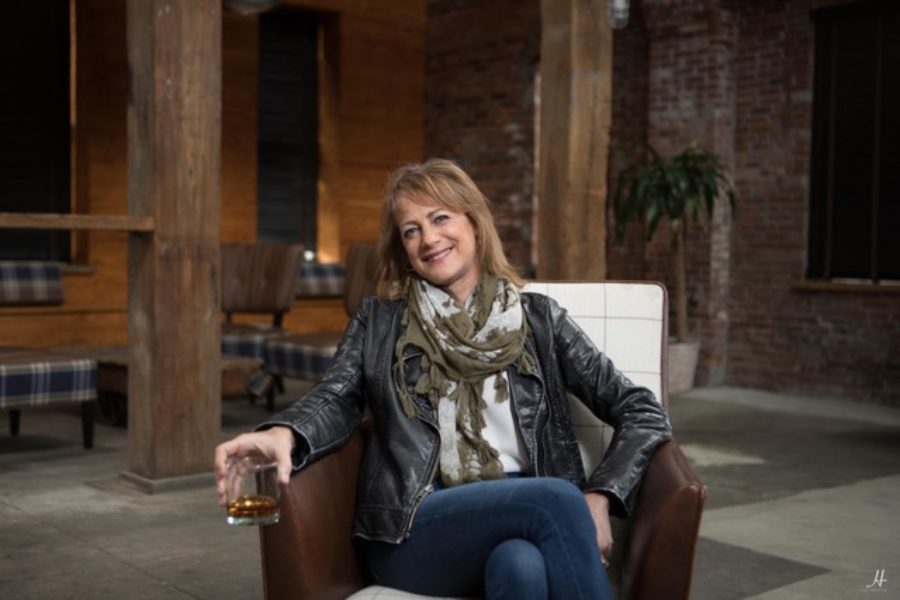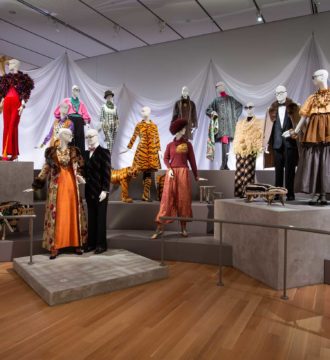Like so many epic love stories, Rhonda Kallman’s love affair with the alcohol industry includes its share of crashes, burns, and revivals.
Kallman, the founder of Dorchester’s Boston Harbor Distillery, reached success in her early ventures, most notably with the wildly popular Samuel Adams beer, but as she continued to innovate and experiment, she faced down challenges on both the personal and professional fronts, from business failure to breast cancer.
But from beer to whiskey, her passion for libations has remained intact through it all. As for her current role in turning Boston into a whiskey hub, “I love everything about it,” she tells Exhale. “The ingredients, the process, how complex it is, the flavors, and the convivial aspects of it. I feel like I’ve been training for this role my entire career. My entire life, really.”
In the ’80s being an entrepreneur was unusual. And the national beer market itself was nothing more than a bland, pale landscape of corn-based pilsner beers.
Peabody native Kallman worked as a bartender and waitress for years in and around Boston before co-founding Boston Beer Company with Jim Koch and then launching the now widely loved Samuel Adams beer in the 1980s. Kallman was just 24 years old when the first six-packs hit the shelves.
She had connected with Koch through her job as executive secretary at the Boston Consulting Group. Not only was Koch a big-shot consultant but he also came from a long line of brewers.
Kallman attributes the success of Sam Adams to the quality of the beer as well as the story behind it.
“It was really a maker’s story, an entrepreneurial story. In the ’80s being an entrepreneur was unusual,” she says. “And the national beer market itself was nothing more than a bland, pale landscape of corn-based pilsner beers.”
Consumer interest piqued when beers like Heineken started coming in and “people thought, ‘Oh imports, that must be better,’ so we had to tell a different story,” says Kallman. “And it was an ingredient story at that.”
Unlike the typical corn- and rice-based beers, Boston Beer Company made Samuel Adams using whole grains, two-row malted barley, and German hops, which gives beer its bitterness and aroma.
“You could clearly see Sam Adams was different. You could literally see the difference in color, the body, and you could taste the freshness,” says Kallman.
Aside from ushering in a new era of local craft beer in Boston and beyond, Kallman also broke the ceiling for women in the industry. As far as Kallman knew at the time, there weren’t others like her and women were only hired as promotional girls or secretaries.
Kallman dealt with customers and distributors who had doubts about a young woman peddling unpopular “dahk beah,” but those doubts dissipated once she began talking about it.
“I was so passionate about the beer and the quality, and why it was so different, and just the education and knowledge of how it was made,” says Kallman. “We didn’t have advertising so that’s all we had to talk about: the beer and the quality of it.”
Kallman went bar-to-bar and door-to-door to spread the word about Sam Adams with ease. She was in her element.
Kallman and Koch knew where their market lay in the first couple of years. “We weren’t selling to nightclubs until the fourth or fifth year because people don’t go to nightclubs to think about what kind of beer they want to drink,” she explains. Instead, they initially sold Samuel Adams beer to pubs in Harvard Square and chef-owned operations that were looking to offer something out of the ordinary.
I’ve actually had people ask me, ‘How many kids do you have?’…‘Who’s home watching them?’ My COO was like, ‘They never ask me that.’
There were times throughout her career where she faced gender discrimination, but, “I’m tough, I’m from Boston, you gotta have thick skin in this business,” she says. “I would end up outworking everybody and, in a lot of ways, outsmarting them.”
Even today, Kallman says she sometimes deals with unconscious biases about businesswomen from potential investors or distributors. “I’ve actually had people ask me, ‘How many kids do you have?’…’Who’s home watching them?’ My COO was like, ‘They never ask me that.'”
And with potential investors, “there’s a big-boys club. Truth be told, there’s no girls club,” she reveals. “The guys with the money won’t invest but they’ll introduce me to other women in my business, just by virtue that they’re women.”
She adds, “That’s great, I’ll meet anybody. But introduce me to some of the guys in your network too.”
The entrepreneur parted ways with Boston Beer Company and launched New Century Brewing Company in 2001 with the idea that it would be an incubator for the craft beer industry. But the timing couldn’t have been worse.
Kallman launched her new company on the eve of 9/11. “I made a fatal mistake. Despite realizing what was going on, particularly in Boston and New York, I continued with my business plan, which was very aggressive. We got burned,” she says.
After the trauma of the terrorist attacks, capital markets grew conservative. According to Kallman, no one wanted to invest in something new—they only wanted things that were familiar. Nevertheless, Kallman pushed on with New Century and launched Moonshot 69, a caffeinated beer concoction, in 2004.
That’s when I lost heart of the beer business that I had been at the forefront of for over 30 years…But that led me here, so there’s a silver lining for everything.
The business seemed to gain traction, with two major beer companies showing interest in investing in New Century, but both deals fell through. That happened in 2006 and 2007. And then came another unexpected battle: Kallman was diagnosed with stage 3 breast cancer in 2008.
While enduring her health crisis, Kallman’s company suffered two final blows: The transfer of her patented formula for Moonshot to a rival company and the banning of caffeinated alcoholic drinks by the Food and Drug Administration. “That’s when I lost heart of the beer business that I had been at the forefront of for over 30 years,” says Kallman.
“But that led me here, so there’s a silver lining for everything.”
Having survived breast cancer, it took Kallman three years to open Boston Harbor Distillery in 2015. Housed in a Civil War-era warehouse on Dorchester’s waterfront, the building pays homage to the entrepreneurs who utilized it over the centuries.
In fact, the distillery’s first product, slated for distribution in stores this September, is Putnam New England Whiskey, named after Silas Putnam, who automated the manufacture of horseshoe nails in the Port Norfolk building in 1850.

Photo courtesy of Boston Harbor Distillery
We’ll drink to that! Boston Harbor Distillery’s Putnam New England Whiskey (left) and their signature “Putnam Smash” (right)
The building’s next tenant was George Lawley & Son shipyard, whose name and yacht grace the label of Lawley’s Small Batch Rum. Kallman also pays homage to her own history, with the 84-proof Spirit of Boston, a product that takes finished Samuel Adams beer varieties, distills them twice, and ages the concoction in barrels.
In moving American brewing away from corporate lagers, Kallman helped revolutionize the nation’s beer industry and paved the way for a proliferation of craft products. She continues to aim high.



 6 min read
6 min read



